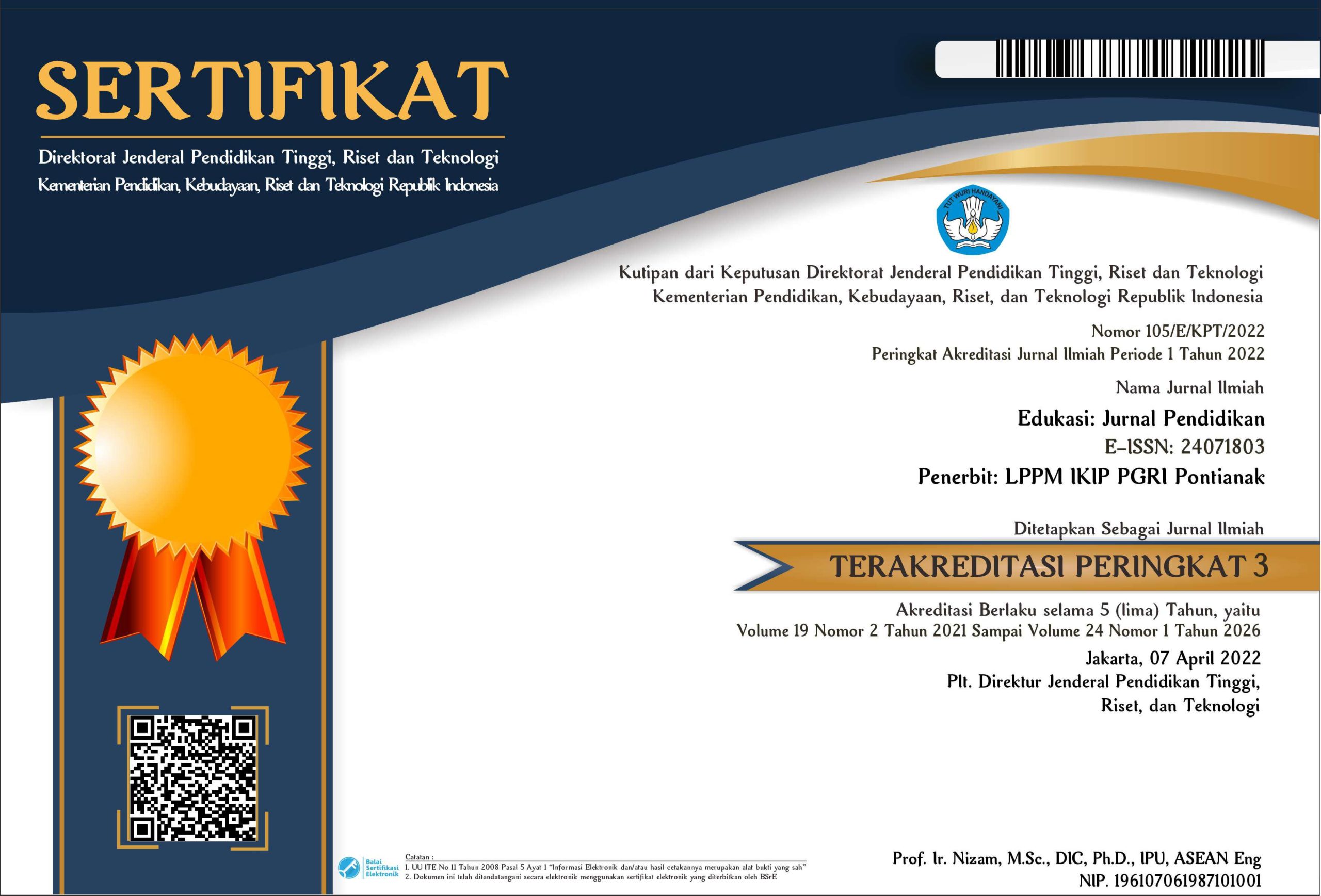PENGARUH PENDIDIKAN KELUARGA DAN ASAL SEKOLAH TERHADAP PEMILIHAN PROGRAM STUDI DAN MOTIVASI BELAJAR SEBAGAI VARIABEL INTERVENING
DOI:
https://doi.org/10.31571/edukasi.v22i2.7700Keywords:
Latar Belakang Pendidikan Keluarga, Asal Sekolah, Pemilihan Program Studi, Motivasi BelajarAbstract
Penelitian ini mengeksplorasi dampak pendidikan keluarga dan asal sekolah pada pilihan jurusan mahasiswa, dengan motivasi belajar sebagai variabel perantara. Menggunakan metode korelasi dengan bantuan aplikasi Smart PLS 3.0, studi ini melibatkan 140 mahasiswa dari Fakultas Pariwisata dan Perhotelan Universitas Negeri Padang. Pengumpulan data dengan menggunakan angket yang berisi pernyataan dengan menggunakan skala likert. Temuan menunjukkan latar belakang keluarga tidak berpengaruh langsung pada pemilihan program studi, tetapi memiliki dampak signifikan terhadap motivasi belajar. Di sisi lain, asal sekolah terbukti berpengaruh langsung baik terhadap pemilihan program studi maupun motivasi belajar. Selain itu, motivasi belajar juga berkontribusi secara langsung terhadap pilihan program studi. Dengan demikian, latar belakang pendidikan keluarga dan asal sekolah memengaruhi pemilihan program studi secara tidak langsung melalui motivasi belajar diperoleh nilai dengan nilai P value 0.000 dan t-statistik 3.835. Hasil penelitian ini memberikan wawasan berharga untuk pengembangan strategi pendidikan yang lebih efektif.
Downloads
References
Allen, J., & Robbins, S. (2010). Effects of interest-major congruence, motivation, and academic performance on timely degree attainment. Journal of Counseling Psychology, 57(1), 23-35.
Amri, M., Jafri, I., & Maigustiana, M. (2019). Motivation, learning facility, family background, and achievement: Direct and indirect effects. Proceedings of the 1st Workshop on Multidisciplinary and Its Applications Part 1, WMA-01 2018, 19-20 January 2018, Aceh, Indonesia.
Boring, A., & Brown, J. (2024). Gender and choices in higher education. Economics of Education Review, 99, 102521.
Edgar, S., Carr, S. E., Connaughton, J., & Celenza, A. (2019). Student motivation to learn: Is self-belief the key to transition and first-year performance in an undergraduate health professions program? BMC Medical Education, 19(1), 111.
Effiong, O. E., & Igiri, C. E. (2015). The influence of family background on the academic achievement of students in basic science. International Letters of Social and Humanistic Sciences, 59, 20–27.
Emmanuel, K. G., Gyimah, J. S.-T. V. A. P. B., & others. (2018). Factors influencing students’ choice of programme of study at the College of Distance Education, University of Cape Coast: Curriculum implication. International Journal of Social Sciences & Educational Studies, 5(2), 205–218.
Febriantomo, E. H., & Suharnan, -. (2015). Training effect of self-efficacy of career decision-making self-efficacy (CDMSE) and N-Ach on students of SMAN 01 Pasuruan, East Java. Persona: Jurnal Psikologi Indonesia, 4(1), 15–28.
Fischer, B., & Golenia, M. (2021). Motivation profiles in the selection of a study program: Why do physical education students decide to choose teacher education? Australian Journal of Teacher Education, 46(11), 1–17.
Gao, W., & Abad, D. D. (2023). Family background and the choice of Hispanic Philology among liberal arts students in China. International Journal of Chinese Education, 12(3), 221–235.
Hair, J. F., Hult, G. T. M., & Ringle, C. M. (2020). Essentials of business research methods (3rd ed.). Taylor & Francis.
Indonesia Career Center Network. (2017). Pemilihan program studi. Indonesia Career Center Network.
Jafari, P., & Aliesmaeili, A. (2013). Factors influencing the selection of a university by high school students. ResearchGate.
Laskin, D. M., Lesny, R. J., & Best, A. M. (2003). The residents’ viewpoint of the matching process, factors influencing their program selection, and satisfaction with the results. Journal of Oral and Maxillofacial Surgery, 61(2), 228–233.
Latan, H., & Ghozali, I. (2015). Partial Least Squares: Concepts, techniques and applications using SmartPLS 3 (1st ed.). Universitas Diponegoro.
Lee, I. H., Rojewski, J. W., & Hill, R. B. (2013). Classifying Korean adolescents’ career preparedness. International Journal for Educational and Vocational Guidance, 13(1), 25–45.
Li, Y. (2024). Analyzing the influence of family background on students’ learning motivation based on structural causal inference approach: Taking CEPS data as an example. Journal of Education, Humanities and Social Sciences, 27, 575–580.
Liang, Q., Liu, J., & Zhou, Y. (2023). The influence of family factors on students' choice of major. Lecture Notes in Education Psychology and Public Media, 12(1), 306–317.
Narca, M. L., & Caballes, D. G. (2021). Learning motivation. International Journal of Asian Education, 2(4), 573–580.
Nye, C. D., Su, R., Rounds, J., & Drasgow, F. (2012). Vocational Interests and Performance: A Quantitative Summary of Over 60 Years of Research. Perspectives on Psychological Science, 7(4), 384-403.
Proboyo, A., & Soedarsono, R. (2015). Influential factors in choosing higher education institution: A case study of a private university in Surabaya. Jurnal Manajemen Pemasaran, 9(1), 1–7.
Serediak, O., & Helland, H. (2023). Family background and the likelihood of pursuing a university degree abroad: Heterogeneity in educational fields. British Journal of Sociology of Education, 44(1), 123–143.
Siregar, R. N., Prabawanto, S., Mujib, A., & Rangkuti, A. N. (2021). Faktor dukungan keluarga dalam mempengaruhi minat mahasiswa memilih jurusan pendidikan matematika di IAIN Padangsidimpuan. Jurnal Ilmiah Pendidikan Matematika, 6(2), 250–260.
SR, P., Sodikin, S., & Agriandita, I. (2023). Pengaruh jurusan asal sekolah terhadap motivasi belajar matematika mahasiswa menggunakan model pembelajaran SAVI. Jurnal Migasian, 6(2), 8.
Subasno, Y., Pd, S., & Th, M. (2019). Meningkatkan motivasi belajar pada mahasiswa “setengah hati”. Jurnal Pendidikan dan Pembelajaran.
Xing, Y., Hu, Y., & Zhou, J.-Z. (2021). Higher education and family background: Which really matters to individual’s socioeconomic status development in China. International Journal of Educational Development, 81, 102334.
Downloads
Published
How to Cite
Issue
Section
License
Copyright (c) 2024 Naseh Ulwan, Yulia Mandasari, Ida Rochanawati, Wiwik Gusnita

This work is licensed under a Creative Commons Attribution-NonCommercial 4.0 International License.
Authors who publish in this journal agree to the following terms:
- Authors retain copyright and grant the journal the right of first publication with the work simultaneously licensed under a Creative Commons Attribution License (CC-BY-NC) that allows others to share the work with an acknowledgment of the work's authorship and initial publication in this journal.
- Authors are able to enter into separate, additional contractual arrangements for the non-exclusive distribution of the journal's published version of the work (e.g., post it to an institutional repository or publish it in a book), with an acknowledgment of its initial publication in this journal.
- Authors are permitted and encouraged to post their work online (e.g., in institutional repositories or on their website) prior to and during the submission process, as it can lead to productive exchanges, as well as earlier and greater citation of published work.















